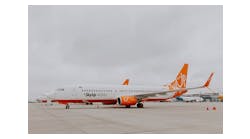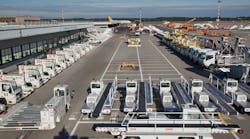The airport Travel Retail and Duty Free industry can certainly benefit from the introduction of digital technology – but the idea that the personal touch, delivered by real people, can be replaced with the cold touch of a computer screen is far from the truth.
Yes, we are seeing the rise of personalisation in e-commerce and digital marketing. The classic example, of course, is Amazon, with its ability to show online shoppers products which they might like, based on their previous browsing and purchase history.
But while that works online for the world’s biggest retailer, with access to billions of items of stock and the luxury of being able to deliver via mail, it’s more complicated when you have a limited amount of stock and the customer is standing in your store.
It’s even more complicated in Travel Retail, where shoppers can often be daunted by airport processes or turn a blind eye to retail as they depart for their holiday.
Recent research published by Swiss analysts M1nd-set has been interpreted as showing that roughly 70% of shoppers decide what they are going to buy before they get to the Duty-Free outlet, and that this supports the argument that in Travel Retail personalisation, in an e-commerce and online advertising sense, is a major driver of sales. But a closer examination of the M1nd-set research suggests that this isn’t actually the case.
What M1nd-set seems to be saying is that overall, 81% of Duty Free shoppers said they did some planning before they got to the store, while 19% said they bought on impulse. But that’s not the same as saying that 81% had already made every decision about everything they ended up buying before walking into the store.
What the research does show is that 12% of people said they decided on a specific product in advance and 10% on a specific brand in advance. Just under a quarter (23%) said they planned “with some idea in mind”, just over a quarter (26%) said they planned “without a specific idea” and 10% said they planned with a budget in mind.
Added to that, there is the question of whether they bought something else – personally, I would be interested to find out how many went in with a shopping list and came out with everything on it and only what was on it. Let’s face it, when was the last time you went to the supermarket with a shopping list and only bought what was on it? That requires a steely determination, which I know I’m not capable of!
The more recent Duty Free World Council (DFWC) Quarterly KPI Monitor for Q3 2018, produced in conjunction with M1nd-set, suggests that the experience matters for passengers. A growing number of Duty Free shoppers (32%) state that having a “truly different experience” is among their main satisfaction drivers and one of the main elements having an impact on overall customer satisfaction is “service level” – but there’s no mention of technology. As DFWC President Frank O’Connell says: “Experiential retail is among the top reasons for shopping in airports [but] it’s important to note that a lack of experiential retail is also what is keeping shoppers away.”
Although brands are continuing to grow their online and digital marketing spend, they also recognise the importance of getting face to face with customers in the real world. Despite – or perhaps because of – the increasingly virtual world in which we live, the human touch has arguably never been more important. And those brands that deliver the best personal shopper experience using real people, alongside digital media, will prosper.
This means it’s time to up the ante in terms of sales and promotional travel retail staff; whether operating the till or presenting a pop-up brand experience, each sales person should behave like a true brand ambassador. It’s vital they are not only well trained in terms of brand and product knowledge, but also reflect the brand in terms of having an affinity with its core target audience and their personal profiles.
Face to face interactions by properly trained brand ambassadors grab shoppers’ attention, start conversations and drive sales. In store, no matter how amazing an activation may look, it is the brand ambassadors who will lead the activity, engaging with customers from the start and ultimately sealing the deal.
Don’t forget, a high proportion of sales in Travel Retail are in categories such as perfume, skincare, high-end liquor and luxury fashion. Shoppers looking to buy items like these want the reassurance of interaction with a real person, not a ‘chat bot’ or a pre-programmed on-screen script. People have warmth, empathy and flexibility – not values which robots and computers tend to display.
Once passengers walk into the airport retail environment, well-trained, multi-lingual brand ambassadors can be a game-changer; by recognising and even celebrating passengers’ cultural backgrounds, unique qualities and interests in ways that digital technology can’t. And if technology is being used to enhance the experience or collect key customer data, brand ambassadors provide the human link to introduce and guide shoppers to getting the most from it.
This sentiment is backed up by M1nd-set owner and CEO Peter Mohn, who said: “Our research also indicates that footfall would definitely increase if travellers knew they could find more unique experiences when shopping in airports. This should be reflected in store design, with greater focus on Sense of Place, a more personalised customer service approach and more proactive use of technology in-store, as well as in the way the stores communicate with shoppers, for example highlighting testing and sampling opportunities.”
When customers do venture in-store, they will be looking to enhance their experience in a way that simply can’t be delivered online. Creating a personal shopping experience that sparks emotion will, in turn, have a positive viral effect. Digital media can attract people and begin conversations, but it’s person-to-person contact that turns a conversation in to a relationship. And relationships build sales.
Jason Miles is managing director of leading retail staffing and marketing services provider Blackjack Promotions (a trading division of OmniServ – part of ABM). In addition to this, he is currently Co-Chairman of the Airport Promotions Agencies Association (APA). He brings 18 years’ experience in the travel retail industry with Dufry, where he held a variety of roles, most recently as Destination Targeting Manager UK. Jason is widely acknowledged as a specialist in how cultural understanding can help retailers and brands create bespoke service opportunities.





